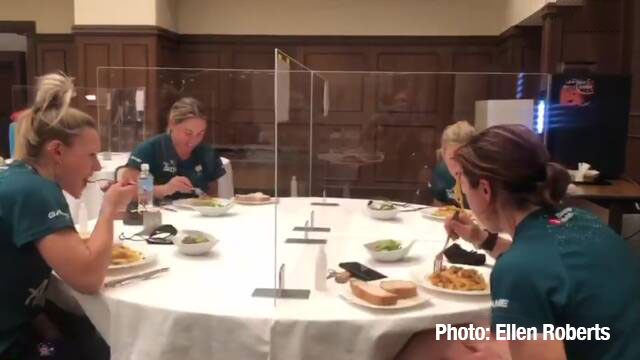The athletes landed at Narita Airport on Tuesday, 52 days before the opening ceremony. They headed straight to the city of Ota, in Gunma Prefecture. On Sunday, the team plays its first competitive match in more than a year, facing off against a local university team.
The Australians arrived early to make preparations on Japanese soil that will help them adjust from the southern hemisphere winter to a humid Japanese summer. But when they aren’t at the training ground, they are sequestered in their hotel.
It will be a similar story for the thousands of competitors and officials coming from around the world. Strict measures are in place to reduce the risk of infection.
Even though all members of the Australian softball team have been vaccinated, they are required to take PCR tests every day they are in Japan.
Part of their hotel has been roped off exclusively for the athletes to ensure minimal contact with other guests. The players and support staff are not allowed to leave, except to visit the ballpark. They must use the back door only. City officials are delivering daily necessities.
Gunma Governor Yamamoto Ichita says it’s important to get this first training camp right if the Olympics are to be a success.
Pitcher Ellen Roberts said the players understand that people in their host town are concerned about foreigners arriving at a time like this and pledged full cooperation: “We want to fully respect the rules, and follow all the regulations to make sure not only we are staying safe but also the people around us.”
Watch Video 00: 47
The softballers’ stay in Ota City is part of a program designed to ensure that regional Japan doesn’t miss out on the economic and cultural benefits from the Olympics. But the coronavirus pandemic has changed many aspects.
Ota officials had hoped to stage a welcome ceremony, but had to drop the idea, as well as shelving plans for school visits by the players.
“I wanted the students to actually meet with the athletes, but I’d be grateful if we could do something online,” says Nozawa Hiromichi, vice principal of the Gunma Kokusai Academy Elementary School. “This is a rare opportunity.”

Originally, 528 municipalities registered to be host towns for foreign teams. More than 100 of them have either withdrawn or been told the teams are no longer coming.
About 80 percent of the cancellations have been at the request of the teams. Some plan to go straight to the athletes' village in Tokyo without any training camps, due to concerns over Japan's coronavirus situation. Others decided it was too difficult for athletes to make last-minute preparations with the anti-infection restrictions that are in place.
Some municipalities withdrew their offers due to local cluster infections, and a few said that they wanted to focus resources on the ongoing vaccine rollout.
Despite the disruptions, Marukawa Tamayo, Minister for the Tokyo Olympic and Paralympic Games, remains optimistic that the program to engage regional areas can be a success. “There seems to be a considerable number of municipalities that are still willing to host training camps, and we would like to provide all the support we can,” she says.

